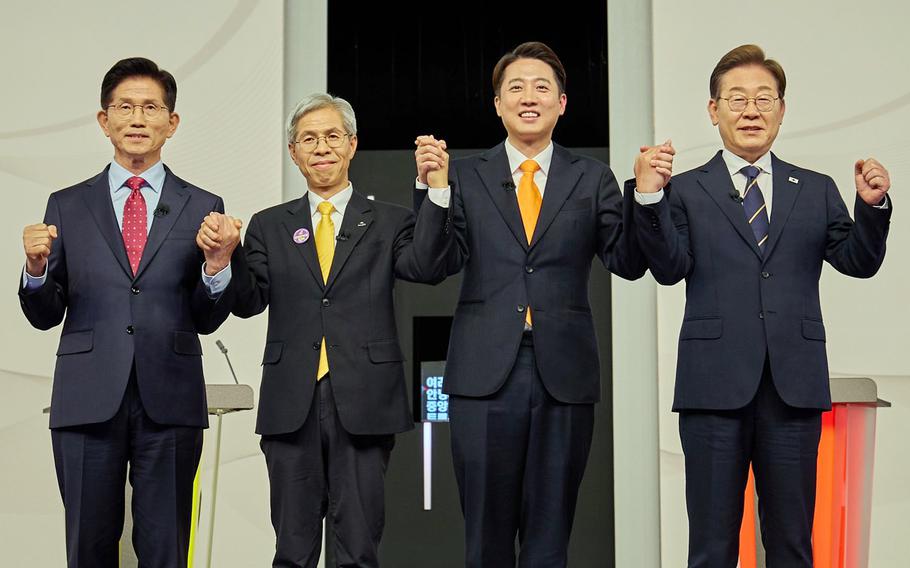
South Korean presidential candidates, from left, Kim Moon-soo of the People Power Party, Kwon Young-kook of the Democratic Labor Party, Lee Jun-seok of the New Reform Party and Lee Jae-myung of the Democratic Party pose after a televised debate in Seoul on May 18, 2025. (Lee Jae-myung)
The presidential candidates representing South Korea’s two largest political parties agreed on the importance of the country’s relationship with the United States during a recent televised debate but differed on how to handle its adversaries.
Lee Jae-myung of the liberal Democratic Party and Kim Moon-soo of the conservative People Power Party reaffirmed the 72-year U.S.-South Korea alliance as foundational to the country’s security.
Kim and Lee “totally understand the importance of the South Korea-U.S. alliance,” Hahm Sung Deuk, dean of Kyonggi University’s Graduate School of Political Studies, said by phone Tuesday. “The only difference is their approaches toward North Korea, China, Taiwan and Russia.”
Kim, formerly the minister of Employment and Labor, has taken a hardline stance against North Korea, China and Russia, Hahm said. Lee advocated a more engagement-focused approach to foreign policy, he added.
Kim pledged to meet with President Donald Trump following South Korea’s June 3 presidential election to discuss North Korea’s nuclear ambitions, China relations and trade.
“Trust is the most important thing in the discussion with Trump,” he said in response to a moderator’s question during Sunday’s debate. “We can only bolster the South Korea-U.S. alliance when we can trust each other.”
Lee agreed the alliance is “a core value in our security” but cautioned against full reliance on the United States.
“We should not fully depend on the alliance,” he said. “There is no need for us to intentionally exclude or stand hostile against China or Russia. Diplomacy should always focus on national interest and practicality.”
A Realmeter poll of 1,509 South Korean adults showed Lee leading with more than 50% of voter support, followed by Kim with nearly 36%. The poll, conducted over three days beginning May 14, had a margin of error of 2.5 percentage points.
Both candidates are aware that most South Korean voters view the alliance with Washington as essential, Hahm said.
Approximately 28,500 U.S. troops are stationed in South Korea to defend it from North Korean aggression. The U.S. also has a Terminal High Altitude Area Defense, or THAAD, system deployed to the South and frequently dispatches aircraft carriers and bombers for joint training exercises.
Kwon Young-kook of the progressive Democratic Labor Party and Lee Jun-seok of the neo-conservative New Reform Party — candidates who together command less than 10% support in recent polls — also participated in the debate in Seoul.